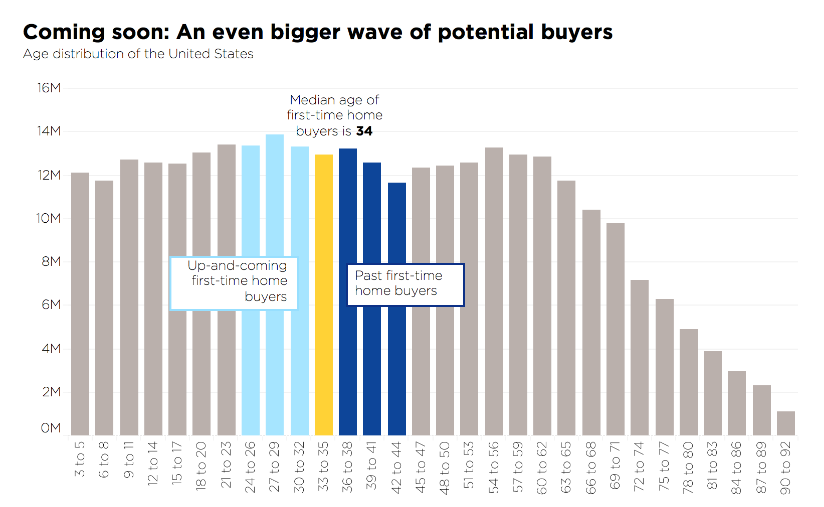Nearly 45 million people in the U.S. will reach the typical age for first-time home buyers in the next 10 years – 3.1 million more than the past decade – creating more demand in an already challenging market for those looking to get into their first home.

The typical first-time home buyer in the U.S. is 34 years old. There are 44.9 million Americans aged 24-33, or potential future first-time home buyers, compared with 41.8 million people aged 35-44, or potential past first-time home buyers, a 7.4% increase.
For the past several years, the housing market has been characterized by shrinking inventory and higher prices, particularly in the least expensive third of homes – the homes most likely to be targeted by first-time home buyers. These starter homes have gained 57.3% in value over the past five years, a median increase of $47,600, while for-sale inventory in this price range has fallen by 23.2%. Over the same time period, the most expensive third of homes gained 26% in value and homes in the middle third appreciated 36.8%.
Though the current housing market is softening, this coming wave of buyers sets up for a future starter-home market with now-familiar dynamics: relatively high demand and low supply, in which the stiff competition among buyers exacerbates the affordability issues caused by rising prices.
"The potential first-time buyer bulge, without inventory to meet it, suggests that the typical age of first-time buyers will continue to be pushed further and further out. The rate of single-family construction is still behind the pace we experienced in the 1990s, and without an increase in truly new supply, would-be first-time buyers will instead persist in the rental market," said Skylar Olsen, director of economic research at Zillow®. "Buyers making the transition from renting to homeownership helps ease rental demand, which limits rent-price growth. If this coming wave of buyers have to compete fiercely for homes to purchase, that could drive up rent prices as well as home values."
The growth in potential future first-time home buyers is more extreme in some markets, including San Diego and Boston, already among the 10 least affordable large housing markets. Both metros will see a nearly 20% increase in the next wave of potential first-time home buyers compared to the previous wave.
First-time buyers are facing difficulties saving for a down payment – a recent Zillow analysis found that buyers need 1.5 years longer to save for a down payment than they did 30 years ago – and securing a loan. Nearly four times as many first-time buyers who obtained a mortgage last year were denied at least once (29%) compared to repeat buyers (8%)ii.
Some markets provide better conditions for first-time buyers with a combination of lower home values, strong appreciation forecasts, available supply and a high share of listings with a price cut. The three best markets for first-time home buyers in the 2019 home shopping season are Tampa, Las Vegas and Phoenix.